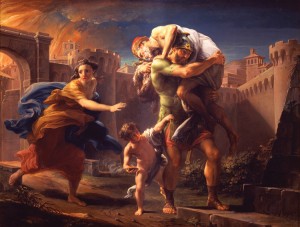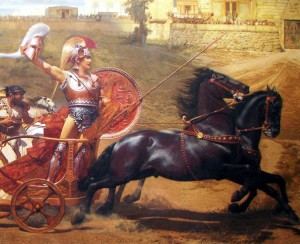Mythic Monday: Heroic Aeneas
Monday, January 9th, 2017January 9, 2017
When it comes to mythical figures, few have greater literary fame than the pious Trojan and Roman hero, Aeneas. Son of the human prince Anchises and the Greek goddess Aphrodite, Aeneas was a demigod. There was nothing half-god about his exploits, however. Aeneas compiled such a legendary record, in fact, that he is the subject of one of the world’s greatest poems of heroic adventure, the Aeneid.

This painting shows Aeneas carrying his father, Anchises, as they flee the destruction of Troy. Credit: Aeneas Fleeing Troy oil painting by Pompeo Batoni (1708-1787), Galleria Sabauda, Turin, Italy (© Scala/Art Resource)
The powerful goddess Aphrodite (called Venus by the Romans) enjoyed making other gods fall in love with mortals. As punishment for her mischief, Zeus—the top god in Greek mythology—forced the same fate upon Aphrodite, who fell in love with a mere man, Anchises of Troy. The result of their love was Aeneas, who grew up to be a famous and powerful Trojan soldier. Largely through the protection of Aphrodite and other gods, Aeneas survived the tragedy that befell his home during the Trojan War.
According to the Aeneid (written by the Roman poet Virgil), after the fall of Troy, Aeneas fled the ruined city with his father and his son Ascanius. On nearby Mount Ida, Aeneas gathered the few other Trojan survivors and sailed away to found a new home. They stopped at various places and had many adventures. In the city of Carthage in northern Africa, Aeneas met Queen Dido. She fell in love with Aeneas, but his destiny and sense of duty (Aeneas’s descendants—namely Romulus and Remus—would found the great city of Rome) forced him to leave Carthage. Dido was so distraught that she committed suicide.
Aeneas finally arrived in Italy. There, he visited the underworld, where he learned about Rome’s future glory. Aeneas then traveled to the Italian region of Latium (now often called Lazio), where he became friends with King Latinus. Aeneas married the king’s daughter Lavinia and founded the port city of Lavinium. Aeneas later disappeared from the mortal world during a battle with a neighboring people called the Etruscans. According to some versions of the myth, he was taken to heaven and became the god Jupiter Indiges.
Aeneas never disappeared from legend, however, thanks to the great poet Virgil. He wrote the Aeneid between 30 and 19 B.C., a period of national pride for the Romans (and some 1,200 years after the Trojan War). The emperor Augustus had just united the people of the Italian peninsula to defeat Rome’s enemies in the eastern provinces. Virgil chose the myth of Aeneas to express ancient Rome’s moral and religious values and to honor Augustus, who claimed to be descended from Aeneas.



